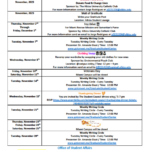Fabiana Bracho, M.S. Katiarina S. Rodriguez, M.S.
Neurocognitive disorders can be described as a decline in mental abilities that can be detrimental to everyday life functioning. Patients who suffer from neurocognitive disorders, like Dementia, experience a reduced ability to cognitively process information, have deficits in memory, and struggle with independence in daily life (American Psychiatric Association, 2013). Dementia can be caused by diseases, stroke, thyroid issues, vitamin deficiencies, reactions to medications, brain tumors, and more. This can lead to an increase in stress, emotional lability, and interpersonal conflicts. Many intervention programs attempt to alleviate stress caused by this disorder and improve cognitive and physical functioning through various techniques. Studies have shown that mind-body therapies improve physical and mental health in cognitively impaired adults (Anderson, Rogers, Bossen, Testad, & Rose, 2017). This blog analyzes yoga as a cognitive and physical rehabilitation intervention for dementia.
Dementia is a neurocognitive disorder severe enough to intervene with independence and daily life. It is potentially reversible, and some forms of dementia can be temporary and overturned with proper and timely intervention. Yoga, as a physical and meditative exercise practice, has demonstrated a plethora of positive effects on individuals worldwide. Analyzing the effects of yoga as a cognitive and physical rehabilitation intervention for dementia patients with major and mild neurocognitive disorders can propose new techniques to promote better daily functioning. Various research studies have analyzed and addressed yoga as an effective cognitive and physical rehabilitation therapy for elderly patients with mild and major neurocognitive disorders.
Research suggests that dementia patients trained in yoga had better physical and mental health than the control groups. Cognitively, individuals with dementia who practiced concentrative meditation, breathing exercises, and yoga poses performed better on paper-pencil tests of attention, significantly improved in immediate and delayed recall of verbal and visual memory, improved in attention and working memory measures, verbal fluency, executive function and processing speed (Hu, Chang, Prakash, & Chaudhury, 2011; Sivakumar, et al., 2013). Significant improvement in executive functioning and verbal word recall was also seen in the Stroop Word Color Task and Animal Naming after 5 months of intervention (Eyre, et al., 2017). Physical bodily improvements included an increase in body awareness, movement memory and functional skills, balance, gait speed, lowered blood pressure, reduced respiration rate, strengthened cardiopulmonary fitness, enhanced body flexibility, improved muscle strength and endurance, improved balance, and increased joints motion (Fan & Chen, 2011; Mccaffrey, Park, Newman, & Hagen, 2014); Wu, et al., 2014). Social changes included more coherent social interactions and improved interpersonal relationships, including the ability to create new relationships (Wu, et al., 2014).
Research demonstrates that yoga as an intervention resulted in the improved functionality of patients with mild and major neurocognitive disorders, like dementia. Regular practice of meditating and physical activity may reduce neurocognitive decline and can serve as new techniques and practices that could be adopted by professionals working with the geriatric population. Future research should focus on the effects of changing the lifestyle of elderly patients by adding exercise and yoga in early intervention practices to delay the onset of neurocognitive disorders. Future research should also focus on assessing individuals with more severe forms of dementia and conducting a longitudinal study to assess the long-term maintenance effects of yoga on health promotion and neurocognitive performance in the geriatric population.
References
American Psychiatric Publishing. (2013). Diagnostic and statistical manual of mental disorders: Dsm-5.
Washington (D.C.).
Anderson, J. G., Rogers, C. E., Bossen, A., Testad, I., & Rose, K. M. (2017). Mind-Body Therapies
in Individuals With Dementia: An Integrative Review. Research in Gerontological Nursing, 10(6), 288–296. doi: 10.3928/19404921-20170928-01
Bademli, K., Lok, N., Canbaz, M., & Lok, S. (2018). Effects of Physical Activity Program on cognitive
function and sleep quality in elderly with mild cognitive impairment: A randomized controlled trial. Perspectives in Psychiatric Care, 55(3), 401–408. doi: 10.1111/ppc.12324
Eyre, H. A., Siddarth, P., Acevedo, B., Dyk, K. V., Paholpak, P., Ercoli, L., … Lavretsky, H. (2017). A
randomized controlled trial of Kundalini yoga in mild cognitive impairment. International Psychogeriatrics, 29(4), 557–567. doi: 10.1017/s1041610216002155
Fan, J.-T., & Chen, K.-M. (2011). Using silver yoga exercises to promote the physical and mental health of
elders with dementia in long-term care facilities. International Psychogeriatrics, 23(8), 1222–1230. doi: 10.1017/s1041610211000287
Hu, X., Chang, F., Prakash, R., & Chaudhury, S. (2011). A theoretical model of the efficacy of concentrative
meditation for cognitive rehabilitation of dementia. Medical Hypotheses, 77(2), 266–269. doi: 10.1016/j.mehy.2011.04.031
Mccaffrey, R., Park, J., Newman, D., & Hagen, D. (2014). The Effect of Chair Yoga in Older Adults with
Moderate and Severe Alzheimer’s Disease. Research in Gerontological Nursing, 7(4), 171–177. doi: 10.3928/19404921-20140218-01
Sivakumar, P., Varambally, S., Thirthalli, J., Varghese, M., Basavaraddi, I., Gangadhar, B., … Koparde, V.
(2013). Randomized clinical trial of yoga-based intervention in residents from elderly homes: Effects on cognitive function. Indian Journal of Psychiatry, 55(7), 357. doi: 10.4103/0019-5545.116308
Wit, L. D., O’Shea, D., Chandler, M., Bhaskar, T., Tanner, J., Vemuri, P., … Smith, G. (2018). Physical
exercise and cognitive engagement outcomes for mild neurocognitive disorder: a group-randomized pilot trial. Trials, 19(1). doi: 10.1186/s13063-018-2865-3
Wu, E., Barnes, D. E., Ackerman, S. L., Lee, J., Chesney, M., & Mehling, W. E. (2014). Preventing Loss of
Independence through Exercise (PLIÉ): qualitative analysis of a clinical trial in older adults with dementia. Aging & Mental Health, 19(4), 353–362. doi: 10.1080/13607863.2014.935290
Yang, H., Leaver, A. M., Siddarth, P., Paholpak, P., Ercoli, L., Cyr, N. M. S., … Lavretsky, H. (2016).
Neurochemical and Neuroanatomical Plasticity Following Memory Training and Yoga Interventions in Older Adults with Mild Cognitive Impairment. Frontiers in Aging Neuroscience, 8. doi: 10.3389/fnagi.2016.00277










